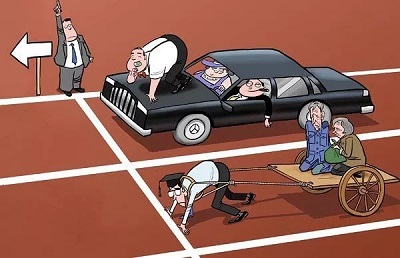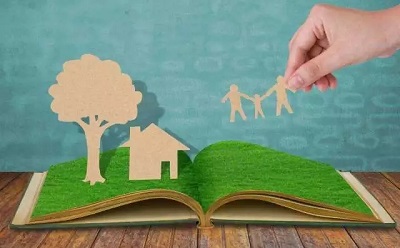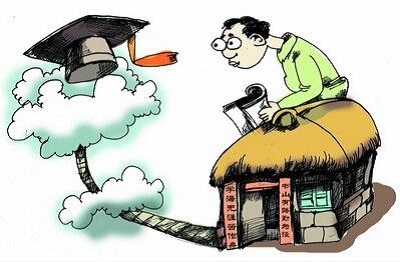
In recent years, special titles such as the “rich second generation” and “poor second generation” have been prevalent and the media reported that it’s unlikely for the “poor second generation” to alter their destinies, even through education.
Natural differences, institutional barriers, uneven distribution of educational resources and other factors make mobility in China’s rural areas more difficult. Statistics show that Chinese family’s expenditure on education occupies one-third of the total family income and education expenditure of the underprivileged families on their children’s education has been increasing by 20 percent for two consecutive years. 40 to 50 percent of disadvantaged families in rural areas claimed the straitened situation is attributed to children’s education. A part of them start casting doubt on the role education plays in elevating social status, in other words, education fails to obtain people their ideal occupations.
Will education help improve social status?
Misunderstanding the question will exert a negative impact on family educational investment decisions and give rise to the notion of “education is useless.” This mindset results in partial rural teenagers and low-income urban groups abandoning the opportunity to change their destinies, thus exacerbating educational and social inequity.
To answer the question, the Institute for Public Policy Research in South China University of Technology conducted a nation-wide questionnaire survey on residents’ education and employment status in 10 cities, including Beijing, Guangzhou, Chengdu and Kunming, from the end of 2016 to early 2017. The survey found that education serves as an intervening variable in the relationship between family factors and the individual's social status. That is to say, family factors influence an individual’s social status and educational background, while educational background impacts the individual’s social status; therefore, they concluded that education plays a significant role in an individual’s social status.

Firstly, the educational background has a particular influence on the current occupation.
The questionnaire demonstrates that 57.1 percent of respondents believe that educational background influences their current occupations, and more than 60 percent of those with college diplomas think the same way, while approximately half of those with high school and lower education believe otherwise and deem individual effort as the critical factor. That is to say, people with college or higher education are prone to occupy professions closely related to what they majored in. Therefore, they believe diplomas are necessary for a job. On the contrary, due to the absence of an educational advantage, most of those with a lower education tend to engage in professions that have lower requirements.
Secondly, Chinese parents still value education.
The survey found that despite slight differences in the schools the rural and urban students attend, over 80 percent of parents would like to send their children to universities.
Thirdly, family influences education background.
The survey found that children’s education background is highly relevant to their parents’. Non-educated parents are content with generic schools and barely expect their children to attend key schools, while more than half of parents with a postgraduate education background expect their children to attend key schools. It is also shown that kid’s education is related to family income because almost all the kids from high-income families attend crucial or private schools.

The conclusion indicates the constraints of family factors, though education still serves as an essential factor in the elevation of social status, and the inheritance of social status is achieved as well as intervened by education. In this process, individual effort, education and family jointly determine the acquisition of an individual’s social status.
The vital role of education in economic and social development should be acknowledged. Besides, education is an important path to improve personal competence and overcome poverty. However, considering China’s uneven distribution of educational resources and Chinese family’s stress on education, the authority should mull more effective measures to reallocate educational resources and implement fair education at an early date.
(Compiled by Li Lei. The author is a researcher at the Institute of Public Policy in South China University of Technology.)


